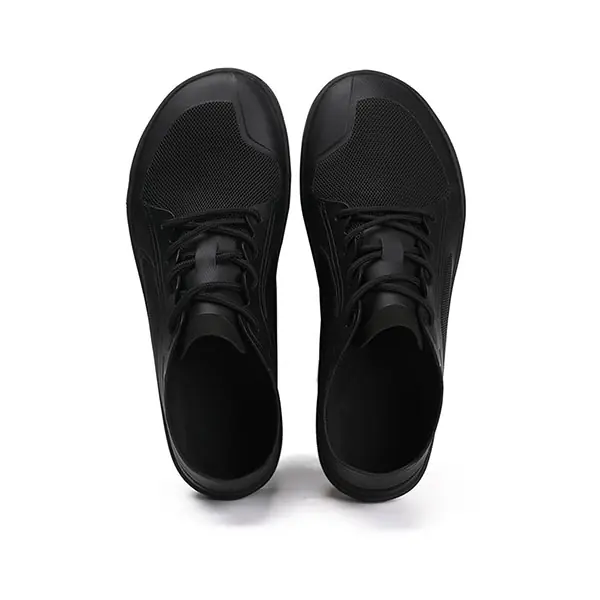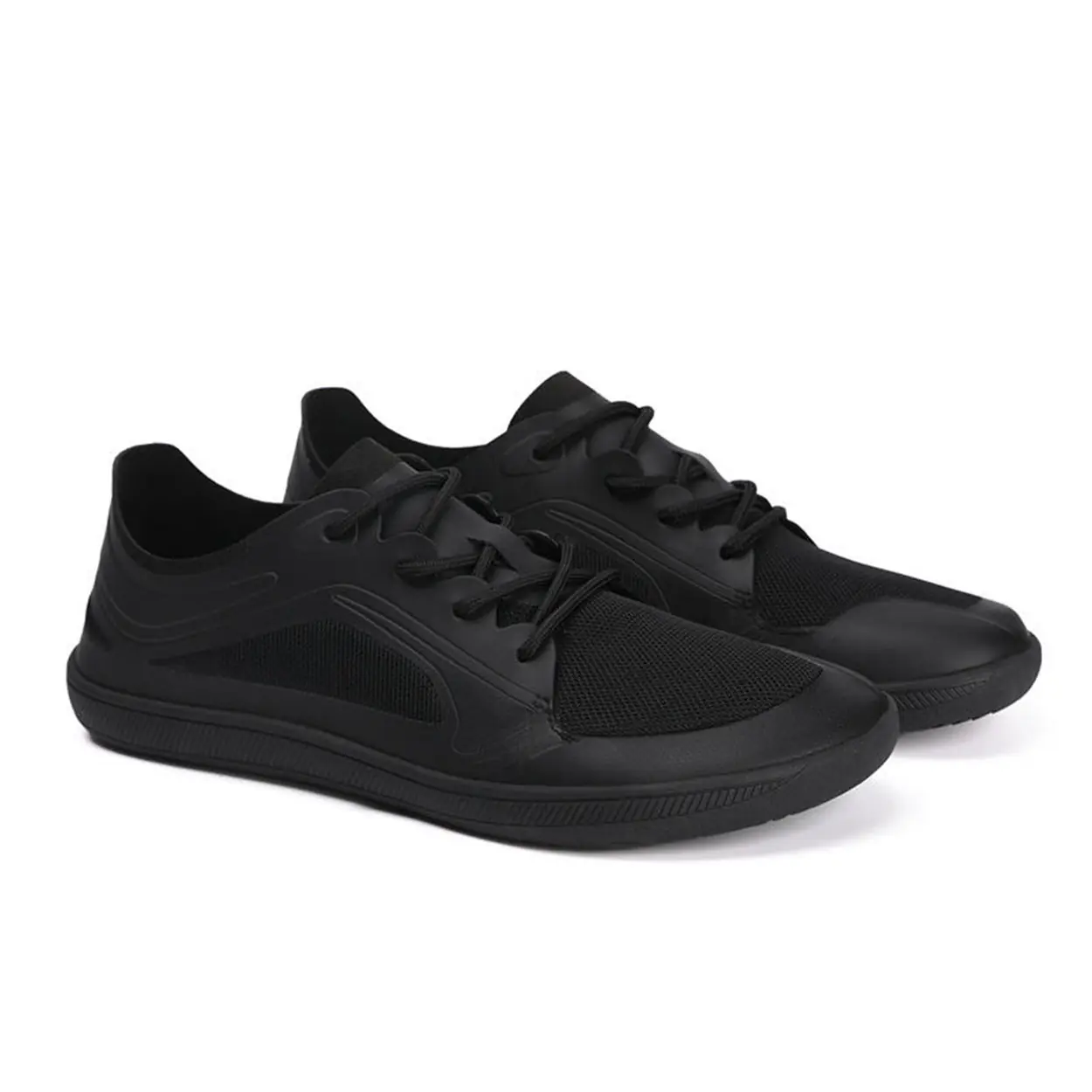
Can You Wear Barefoot Shoes Everyday
Wearing barefoot shoes every day has become a popular trend among those seeking a more natural and comfortable walking or running experience. Barefoot shoes are designed to mimic the sensation of walking barefoot while providing the necessary protection for your feet. But can you truly wear barefoot shoes every day without compromising on comfort or health? In this comprehensive guide, we’ll explore the benefits, potential risks, and best practices for incorporating barefoot shoes into your daily routine.
Table of Contents
What Are Barefoot Shoes?
Barefoot shoes are minimalist footwear designed to allow your feet to move naturally, closely mimicking the feeling of being barefoot. Unlike traditional shoes that often have thick soles, restrictive structures, and arch support, barefoot shoes offer minimal interference, promoting better foot health and natural movement.
Key Features of Barefoot Shoes
- Thin Soles: Typically less than 10mm thick, providing a close-to-ground feel.
- Wide Toe Box: Allows toes to splay naturally, enhancing balance and stability.
- Flexible Construction: Enables natural foot movement without restrictions.
- Lightweight Materials: Reduce the overall weight of the shoe, making movement easier.

Design features of minimalist barefoot shoes. Image Source: Custom Barefoot Shoes
Benefits of Wearing Barefoot Shoes Everyday
Incorporating barefoot shoes into your daily wear can offer numerous advantages for your foot health and overall well-being.
Improved Foot Strength
Barefoot shoes encourage your foot muscles to work harder, leading to stronger and more resilient feet. This can help prevent injuries and reduce discomfort associated with weak foot muscles.
Enhanced Balance and Stability
The minimalistic design of barefoot shoes promotes better balance and stability by allowing more sensory feedback from the ground. This heightened awareness can improve your coordination and prevent falls.
Better Posture
Wearing barefoot shoes can lead to better posture by aligning your spine and reducing strain on your joints. This natural alignment helps distribute your body weight evenly, minimizing the risk of back and knee pain.
Increased Flexibility
Barefoot shoes offer greater flexibility, allowing your feet to bend and flex as they would naturally. This flexibility can enhance your range of motion and overall mobility.
Potential Risks of Wearing Barefoot Shoes Everyday
While barefoot shoes offer many benefits, it’s essential to be aware of potential risks, especially if you’re used to traditional footwear.
Risk of Injury
Transitioning too quickly to barefoot shoes can lead to injuries such as stress fractures or tendonitis. The lack of cushioning means your feet absorb more impact, which can be harmful if you’re not accustomed to it.
Limited Protection
Barefoot shoes provide minimal protection against sharp objects, extreme temperatures, and rough terrains. This makes them less suitable for certain environments or activities where more protection is necessary.
Not Ideal for Everyone
Individuals with specific foot conditions, such as flat feet or plantar fasciitis, may find barefoot shoes uncomfortable or even exacerbate their issues without proper guidance from a healthcare professional.
Transitioning to Barefoot Shoes
If you’re considering wearing barefoot shoes every day, a gradual transition is crucial to allow your feet to adapt.
Start Slowly
Begin by wearing barefoot shoes for short periods, gradually increasing the duration as your feet become stronger and more accustomed to the new footwear.
Strengthen Your Feet
Incorporate foot-strengthening exercises into your routine to prepare your muscles for the increased demands of barefoot shoes.
Listen to Your Body
Pay attention to any discomfort or pain, and adjust your usage accordingly. It’s essential to avoid pushing through pain, which can lead to long-term injuries.
Choosing the Right Barefoot Shoes
Selecting the appropriate barefoot shoes is vital for ensuring comfort and maximizing the benefits.
Consider Your Activity
Different activities require different features in barefoot shoes. For example, running shoes should offer more flexibility and grip, while casual shoes might prioritize style and comfort.
Fit and Size
Ensure your barefoot shoes fit well, with enough room in the toe box to allow your toes to spread naturally. A proper fit prevents slipping and blisters.
Material Quality
Opt for high-quality materials that are breathable, durable, and flexible. Common materials include leather, mesh, and synthetic fabrics.
Comparing Barefoot Shoes to Regular Shoes
Understanding the differences between barefoot shoes and traditional footwear can help you make an informed decision.
| Feature | Barefoot Shoes | Regular Shoes |
|---|---|---|
| Sole Thickness | Less than 10mm | Often thicker and cushioned |
| Toe Box | Wide, allowing natural splay | Narrower, restricting toe movement |
| Flexibility | Highly flexible | More rigid and supportive |
| Weight | Lightweight | Generally heavier |
| Support | Minimal arched support | Enhanced arch and heel support |
Best Practices for Wearing Barefoot Shoes Daily
To maximize the benefits and minimize potential risks, follow these best practices when incorporating barefoot shoes into your daily routine.
Gradual Increase
Start by wearing barefoot shoes for a few hours each day, gradually increasing the time as your feet adapt.
Maintain Foot Hygiene
Keep your feet clean and dry to prevent infections, especially since barefoot shoes allow more sensory feedback from the ground.
Alternate Footwear
Consider alternating between barefoot shoes and traditional footwear to give your feet a break and prevent overuse injuries.
Choose the Right Socks
If you prefer wearing socks, opt for thin, moisture-wicking socks to maintain the barefoot experience without adding bulk.
Foot Health and Barefoot Shoes
Wearing barefoot shoes can significantly impact your foot health, promoting natural movement and reducing common foot problems.
Strengthening Foot Muscles
Barefoot shoes engage various muscles in your feet, leading to increased strength and endurance.
Preventing Foot Deformities
The natural movement allowed by barefoot shoes can help prevent conditions like bunions and hammertoes by reducing restrictive pressure on the toes.
Enhancing Circulation
Better foot movement promotes improved blood flow, reducing fatigue and enhancing overall foot health.
Athletic Performance and Barefoot Shoes
Athletes are increasingly adopting barefoot shoes to enhance their performance and reduce injury risks.
Improved Running Form
Barefoot shoes encourage a midfoot or forefoot strike, which can reduce the impact on joints and improve running efficiency.
Enhanced Agility
The flexibility and minimal design of barefoot shoes allow for quicker movements and better agility during sports and workouts.
Reduced Injury Risk
By promoting natural movement and strengthening foot muscles, barefoot shoes can help prevent common athletic injuries like shin splints and plantar fasciitis.
Lifestyle Compatibility
Barefoot shoes are versatile and can fit seamlessly into various lifestyles and settings.
Casual Wear
With their sleek and minimalist design, barefoot shoes make a stylish addition to everyday casual outfits.
Work Environments
Many barefoot shoes are designed to be professional and comfortable, suitable for various work environments without compromising on style.
Outdoor Activities
Barefoot shoes are ideal for hiking, walking, and other outdoor activities, providing the necessary flexibility and protection without excess weight.
Maintenance and Care of Barefoot Shoes
Proper maintenance ensures the longevity and performance of your barefoot shoes.
Cleaning
Regularly wipe your barefoot shoes with a damp cloth to remove dirt and debris. Avoid using harsh chemicals that can damage the materials.
Drying
Allow your shoes to air dry naturally, away from direct heat sources, to maintain their shape and flexibility.
Storage
Store barefoot shoes in a cool, dry place to prevent mold and mildew growth. Use shoe trees to help maintain their shape when not in use.
User Experiences and Testimonials
Real-life experiences provide valuable insights into the daily use of barefoot shoes.
Increased Comfort
Many users report enhanced comfort and reduced foot pain after switching to barefoot shoes, noting a more natural walking experience.
Improved Athletic Performance
Athletes have shared stories of improved agility and reduced injury rates after incorporating barefoot shoes into their training routines.
Enhanced Foot Health
Users have observed significant improvements in foot strength and overall foot health, attributing these changes to the natural movement facilitated by barefoot shoes.
Expert Opinions on Wearing Barefoot Shoes Everyday
Professionals in the fields of podiatry and sports science offer varying perspectives on the daily use of barefoot shoes.
Podiatrists’ View
Many podiatrists advocate for barefoot shoes, highlighting their benefits in strengthening foot muscles and promoting natural gait. However, they caution against a sudden transition to avoid injuries.
“Barefoot shoes can be a game-changer for foot health, but it’s essential to transition gradually to allow your feet to adapt.”
– Dr. Laura Mitchell, Podiatrist
Sports Scientists’ Insights
Sports scientists emphasize the role of barefoot shoes in enhancing athletic performance by improving proprioception and reducing excessive impact forces.
Manufacturers’ Recommendations
Leading barefoot shoe manufacturers suggest alternating barefoot shoes with traditional footwear and incorporating foot-strengthening exercises to maximize benefits and ensure safety.
FAQs
Can You Wear Barefoot Shoes Everyday?
Yes, you can wear barefoot shoes every day. However, it’s essential to transition gradually to allow your feet to adapt and to choose the right type of barefoot shoes for your activities and foot shape.
What Are the Main Benefits of Wearing Barefoot Shoes Daily?
Wearing barefoot shoes daily can improve foot strength, enhance balance and stability, promote better posture, and increase foot flexibility. Additionally, they can reduce the risk of certain foot-related injuries.
Are Barefoot Shoes Suitable for All Foot Types?
While barefoot shoes offer numerous benefits, they may not be suitable for everyone. Individuals with specific foot conditions or those who require additional support should consult a healthcare professional before making the switch.
How Do I Transition to Wearing Barefoot Shoes Every Day?
Start by wearing barefoot shoes for short periods each day, gradually increasing the duration as your feet grow stronger and more accustomed. Incorporate foot-strengthening exercises and pay attention to any signs of discomfort or pain.
Do Barefoot Shoes Provide Enough Protection for Daily Activities?
Barefoot shoes offer minimal protection compared to traditional shoes. They are suitable for casual wear and light outdoor activities but may not be ideal for environments with sharp objects or extreme weather conditions.
How Should I Care for My Barefoot Shoes?
Clean your barefoot shoes regularly with a damp cloth, air dry them naturally, and store them in a cool, dry place. Avoid using harsh chemicals or direct heat sources to maintain their flexibility and integrity.
Conclusion
Wearing barefoot shoes every day can offer a multitude of benefits, from improved foot strength and better posture to enhanced balance and athletic performance. Barefoot shoes provide a natural and comfortable alternative to traditional footwear, promoting overall foot health and a more mindful walking or running experience.
However, transitioning to barefoot shoes requires patience and gradual adaptation to ensure your feet adjust without injury. By choosing the right pair of minimalist shoes, maintaining proper foot hygiene, and following best practices, you can seamlessly integrate barefoot shoes into your daily life.
Explore the wide range of Men’s Barefoot Shoes and Women’s Barefoot Shoes at Custom Barefoot Shoes to find the perfect pair that aligns with your lifestyle and foot health needs. Embrace the natural movement and experience the profound impact barefoot shoes can have on your daily comfort and overall well-being.

Experience the comfort of daily barefoot shoes. Image Source: Custom Barefoot Shoes
By making informed choices and prioritizing your foot health, you can enjoy the full spectrum of benefits that barefoot shoes offer, ensuring a comfortable and healthy experience for your feet every day.
